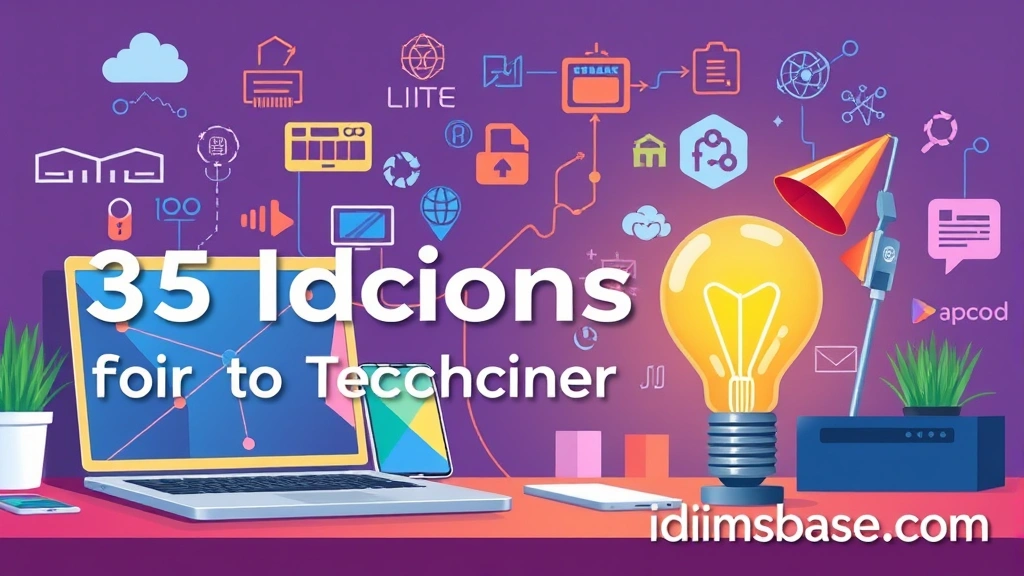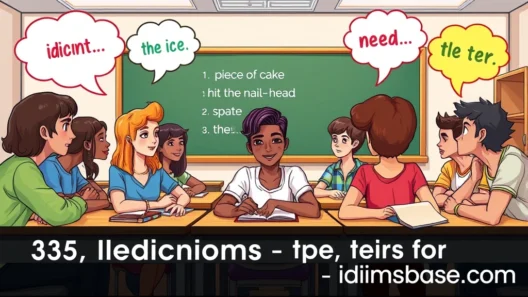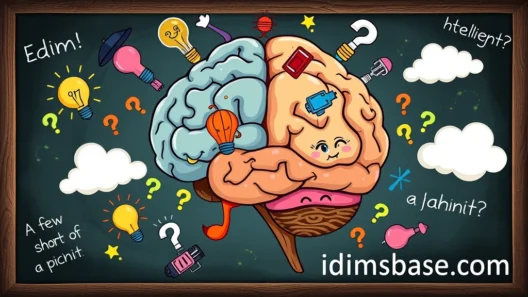Have you ever found yourself in a conversation about the latest gadgets, the internet, or even just your smartphone, and suddenly someone drops a phrase that leaves you scratching your head? Technology, with its rapid advancements and ever-evolving language, has given birth to a fascinating collection of idioms. These aren't just fancy words; they're colorful expressions that perfectly capture the quirks, challenges, and triumphs of our digital world.
Learning these idioms isn't just about boosting your vocabulary; it's about truly understanding the nuances of how we talk about technology. It's about connecting with others on a deeper level, whether you're a tech guru, a casual user, or just someone who loves a good turns of phrase. So, are you ready to dive into the exciting world where language meets innovation? Let's explore 35 brilliant idioms that will make you sound like a true tech insider!
The Digital Dictionary: 35 Tech Idioms You Need to Know
Get ready to level up your language game! Here are 35 essential idioms that will help you navigate conversations about technology with confidence and flair. We’ve even organized them to make your learning journey a breeze.
Idioms About Being Connected and Online
These idioms describe the state of being online, connected, or constantly interacting with digital platforms.
-
Always On: This isn't just about your phone; it means being constantly connected and available, often referring to a culture where work never truly stops. Example: "Since the pandemic, many people feel like they're 'always on' with work emails coming in at all hours."
-
Connected at the Hip: Like two devices tethered together, this idiom means two people are inseparable, often due to constant communication via technology. Example: "Those two are always texting; they're practically connected at the hip."
-
Go Viral: Ah, the dream of every content creator! This means something spreads rapidly and widely across the internet, like wildfire. Example: "That hilarious cat video went viral overnight!"
-
In the Cloud: No, not actual clouds in the sky! This refers to data and applications stored and accessed over the internet, rather than on your computer's hard drive. Example: "I store all my photos in the cloud, so I can access them from any device."
-
Log In/Log Out: These are fundamental actions. To "log in" means to gain access to a computer system or website, while "log out" means to exit it. Example: "Don't forget to log out of your banking app when you're done."
-
Offline: The opposite of being online, meaning you're not connected to the internet or a network. Example: "I'm going completely offline this weekend to truly relax."
-
Plugged In: This means being very knowledgeable or up-to-date with current trends, especially in technology. Example: "She's really plugged in when it comes to the latest AI developments."
Idioms About Functionality and Performance
These expressions talk about how technology works, or sometimes, how it doesn't!
-
Blue Screen of Death (BSOD): A dreaded sight for any computer user! This is a common error message on Windows computers indicating a critical system crash. Example: "My computer just showed the blue screen of death; I think I lost everything!"
-
Crash and Burn: While it sounds dramatic, this idiom means to fail spectacularly, often referring to a system or project. Example: "Their new software update crashed and burned, causing major customer complaints."

-
Cutting Edge: This describes the very latest and most advanced technology. Example: "Their new smartphone features cutting-edge camera technology."
-
Digital Footprint: This refers to the trail of data you leave behind online through your activities. Example: "Be careful what you post; your digital footprint can follow you forever."
-
Download: To transfer data from a server or another computer to your own device. Example: "I need to download the latest software update for my laptop."
-
Freeze Up: When a computer or application stops responding. Example: "My browser keeps freezing up when I try to open too many tabs."
-
Glitch in the Matrix: A playful reference to the movie "The Matrix," meaning a small, unexpected error or malfunction that makes you question reality. Example: "My coffee machine just made tea; I think there's a glitch in the matrix!"
-
High-Tech: Short for "high technology," referring to advanced technological equipment, especially electronics. Example: "Their new office is full of high-tech gadgets."
-
Low-Tech: The opposite of high-tech, referring to basic, less advanced technology. Example: "Sometimes, a good old low-tech pen and paper are all you need."
-
Push the Envelope: To extend the limits of what is possible, often in technology or innovation. Example: "They're really pushing the envelope with their new virtual reality system."
-
Reboot: To restart a computer or system. Often used metaphorically to mean starting something fresh. Example: "Let's just reboot the system and see if that fixes the problem."
-
Run a Diagnostic: To perform tests to identify problems in a system or device. Example: "The technician ran a diagnostic to figure out why my internet was so slow."
Idioms About Information and Data
These idioms focus on the flow, storage, and management of information in the digital age.
-
Bandwidth: While literally referring to data transfer capacity, it's often used metaphorically to mean mental capacity or resources. Example: "I don't have the bandwidth to take on another project right now."
-
Big Data: Refers to extremely large sets of data that may be analyzed computationally to reveal patterns, trends, and associations. Example: "Companies use big data to understand customer behavior."

-
Data Mining: The process of discovering patterns in large data sets involving methods at the intersection of machine learning, statistics, and database systems. Example: "They're using data mining techniques to predict market trends."
-
Garbage In, Garbage Out (GIGO): A fundamental concept in computer science, meaning that if you input bad data, you'll get bad results. Example: "Remember, GIGO applies to your diet too – eat junk, feel junk!"
-
Information Overload: Being exposed to too much information, making it difficult to process or make decisions. Example: "After scrolling through news all day, I'm experiencing information overload."
-
The Information Highway: An older term for the internet, emphasizing its role as a global network for communication and information exchange. Example: "The information highway has transformed how we learn and connect."
Idioms About People and Technology
These idioms describe how individuals interact with and are affected by technology.
- Digital Native: Someone who has grown up in the digital age and is comfortable with technology. Example: "My younger sister is a true digital native; she understands tech intuitively."
-
Early Adopter: A person who starts using a new product or technology as soon as it becomes available. Example: "He's always an early adopter, buying every new gadget the day it comes out."
-
Late Adopter: Someone who adopts a new product or technology much later than others. Example: "My grandmother is a late adopter; she just got her first smartphone last year."
-
Robot (or Robotic): Can refer to an actual robot, or metaphorically to someone acting without emotion or personality. Example: "After working all night, I felt completely robotic."
-
Tech-Savvy: Knowledgeable and proficient in the use of technology. Example: "My nephew is incredibly tech-savvy; he can fix any computer problem."
-
Unplug: To disconnect from electronic devices and the internet, often to relax or focus on other things. Example: "I need to unplug for a few days and go camping."
Miscellaneous but Mighty Idioms
And a few more essential tech idioms to round out your knowledge!

-
Byte the Dust: A playful pun on "bite the dust," meaning a computer or device has broken down or stopped working. Example: "My old laptop finally bit the dust after years of service."
-
Keyboard Warrior: Someone who is aggressive or argumentative in online discussions but often less so in real life. Example: "Don't pay attention to that keyboard warrior; they're just looking for an argument."
-
On Autopilot: When a system or person is functioning automatically without direct control, often meaning doing something habitually. Example: "I was so tired this morning, I drove to work on autopilot."
-
The World Wide Web (WWW): The global system of interconnected computer networks that uses the internet's standard communication protocols. Often just "the Web." Example: "The World Wide Web has revolutionized how we access information."
Key Takeaways
You've just scrolled through a treasure trove of tech idioms! Here's a quick recap of what you've learned:
- Language Evolves with Tech: Our language is constantly adapting to new technological advancements, creating fun and insightful idioms.
- Context is Key: Understanding these idioms helps you grasp the nuances of conversations about digital life.
- Sound Like an Insider: Using these phrases can make you sound more knowledgeable and comfortable in tech discussions.
- Beyond the Literal: Many tech idioms have metaphorical meanings that extend beyond just computers and gadgets.
Frequently Asked Questions (FAQ)
Q1: Why are there so many idioms related to technology?
A1: That's a great question! Think about how rapidly technology has integrated into every aspect of our lives. When something becomes so pervasive, it naturally starts to influence our language. Idioms are a creative way for us to describe complex ideas, new experiences, and common frustrations or triumphs related to this ever-present force in our world. They make abstract tech concepts more relatable and even humorous!
Q2: Are these tech idioms used globally, or are they specific to certain regions?
A2: While many of these idioms originated in English-speaking countries, particularly the United States due to its role in tech innovation, they have largely become part of a global, informal English lexicon, especially among those who interact with technology regularly. The internet itself has been a massive driver in spreading these phrases worldwide. However, some might be more common in certain areas than others, and regional variations or equivalents in other languages definitely exist!
Q3: How can I remember all these idioms?
A3: The best way to remember idioms is to use them! Here are a few tips:
- Contextual Learning: Try to use them in sentences or conversations related to technology. The more you connect them to real-life situations, the better they'll stick.
- Flashcards: Write the idiom on one side and its meaning and an example sentence on the other.
- Practice with Friends: Challenge yourself to use one new idiom a day when talking to friends or colleagues.
- Read Tech News: You'll often find these idioms naturally embedded in articles and discussions about technology. Pay attention to how native speakers use them.
- Don't Be Afraid to Make Mistakes: It's part of the learning process!
Q4: Can I use these idioms in formal writing or professional settings?
A4: It depends on the context! Many of these idioms, like "cutting edge," "early adopter," or "tech-savvy," are perfectly acceptable and even common in professional tech discussions, presentations, or informal business communications. However, more casual or humorous ones, like "glitch in the matrix" or "byte the dust," are generally better suited for informal conversations or creative writing. Always consider your audience and the tone you want to convey. When in doubt, err on the side of formality.
Q5: Will new tech idioms keep emerging?
A5: Absolutely! The world of technology is constantly evolving, and as new innovations, devices, and digital experiences emerge, so too will new ways of talking about them. Just think about how quickly terms like "going viral" or expressions related to AI have entered our everyday vocabulary. Language is dynamic, and it will continue to adapt and create new idioms to capture the essence of our ever-changing technological landscape. It's an exciting time to be a language learner!
We hope this deep dive into tech idioms has been both informative and fun! Keep practicing, and soon you'll be speaking like a true tech wizard. Which idiom was your favorite? Let us know in the comments below!






